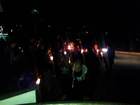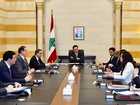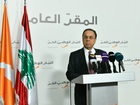Spotlight
-
 Lebanon
Aoun stresses state role, floats initiative for negotiations with Israel
President Joseph Aoun on Friday said that Lebanon "has grown tired of the state's absence" and "the Lebanese have grown exhausted of the projec...
2
Lebanon
Aoun stresses state role, floats initiative for negotiations with Israel
President Joseph Aoun on Friday said that Lebanon "has grown tired of the state's absence" and "the Lebanese have grown exhausted of the projec...
2
-
 Lebanon
Haykal calls on Lebanese to trust army despite 'slanderous campaigns'
Army chief Rodolphe Haykal called Friday on the Lebanese to trust and support the army as they have always done, amid American and domestic pressur...
3
Lebanon
Haykal calls on Lebanese to trust army despite 'slanderous campaigns'
Army chief Rodolphe Haykal called Friday on the Lebanese to trust and support the army as they have always done, amid American and domestic pressur...
3
The Association of Banks in Lebanon on Wednesday called for negotiations with the holders of Lebanon’s Eurobonds regarding the March 9 payment.
“We stressed to Mr. Premier ABL’s stance that if the government is inclined to reschedule the debt, this rescheduling must happen in an organized manner, which means through negotiations with bond holders, especially that the foreign investment funds have so far showed readiness to negotiate on this basis,” ABL chief Salim Sfeir said after meeting PM Hassan Diab along with a delegation from the Association.
 Full Story
Full Story
Parliament Speaker Nabih Berri on Wednesday held talks with visiting Greek Foreign Minister Nikos Dendias and discussed with him the bilateral ties, the situation in Lebanon and the region, and means to boost cooperation between the two countries.
Separately, Berri told MPs during the weekly Ain el-Tineh meeting that restructuring Lebanon’s debt is the “best solution” for the country’s dire financial and economic crisis.
 Full Story
Full Story
Interior Minister Mohammed Fahmi expressed readiness to authorize accountability mechanisms for any corrupt mayors or employees in Lebanon’s municipalities, LBCI TV said on Wednesday.
 Full Story
Full Story
Greek Foreign Minister Nikos Dendias led a delegation to Beirut on Wednesday to hold talks with President Michel Aoun, Speaker Nabih Berri, Prime Minister Hassan Diab, and Foreign Minister Nassif Hitti, the National News Agency reported on Wednesday.
 Full Story
Full Story
Lebanon plans to invite eight firms to compete on providing financial advice on whether it should pay or default on its $1.2 billion Eurobond debt, which matures next month, media reports said on Wednesday.
 Full Story
Full Story
Unemployment rate in Lebanon has hit dangerous levels with 300 thousand individuals left jobless amid an unprecedented economic crisis sweeping the country since October.
 Full Story
Full Story
Anti-government demonstrators on Tuesday held candlelight vigils in Beirut, Baalbek and Tyre in tribute to Ahmed Toufiq, a protester who died of his wounds Monday after being injured in clashes in the northern city of Tripoli in October.
The demonstrators staged the sit-ins at Beirut’s Martyrs Square, Baalbek’s Khalil Mutran Square and Tyres al-Alam Square.
 Full Story
Full Story
Justice Minister Marie-Claude Najm on Tuesday asked State Prosecutor Ghassan Oueidat to request information from the central bank’s Special Investigation Commission on alleged Eurobond operations involving some Lebanese banks and global financial firms.
The National News Agency said Najm's move follows “media reports that some Lebanese banks have placed their bonds under the name of some foreign institutions to pressure the State to pay the debt.”
 Full Story
Full Story
A delegation from the World Bank's private lending arm met Tuesday with Prime Minister Hassan Diab, as the debt-ridden country seeks assistance to rescue its moribund economy.
The meeting tackled the possibility of “launching joint cooperation projects between the public and private sectors and the issue of developing the transportation sector and the airport,” the National News Agency said.
 Full Story
Full Story
The Strong Lebanon parliamentary bloc, which is led by the Free Patriotic Movement, on Tuesday stressed the importance of recovering the state’s stolen funds and establishing a financial crimes court among other measures.
Decrying the “continued suffering of the Lebanese due to the selective and unfair measures that the banks are imposing,” the bloc said the central bank is yet to answer its inquiry about the suspicious transfers abroad of large sums of money.
 Full Story
Full Story



